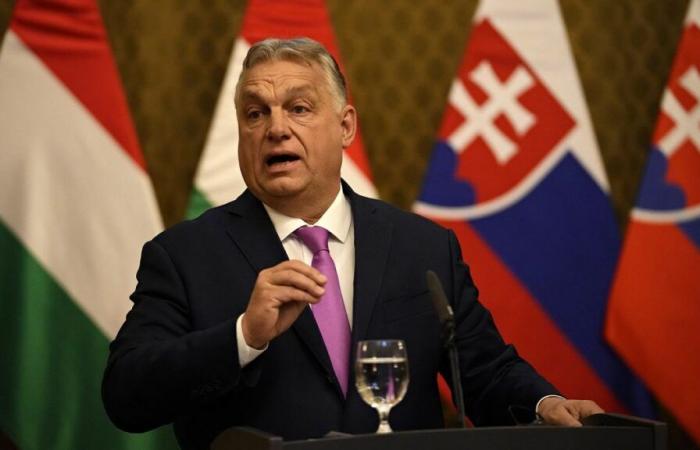The Hungarian government has said that the renewal of EU sanctions against Russia for its invasion in Ukraine should not be automatic, in remarks that threaten the crumbling of Brussels’s reaction to war.
ADVERTISEMENT
Hungary has intensified its criticisms against the EU sanctions against Russia, while a crucial deadline for the renewal of restrictions is getting closer, supplying fears that the punitively constructed punitive regime from 15 different packages will soon be undone.
The sectoral sanctions imposed by the EU in Moscow for the invasion of Ukraine include vast bans on energy, technology, finance, luxury, transport and radio products, as well as a freezing of 210 billion euros in assets held by the Russian central bank within the European Union.
However, these measures must be extended every six months, the next deadline being set for January 31.
The EU needs the unanimous support of its members to continue the sanctions, but Hungary has taken the opportunity for, once again, questioning the efficiency and relevance of the regime, and to assert that ‘Investiture of Donald Trump to the presidency of the United States creates a new political context.
“The sanctions against Russia have done more harm to Europe than in Russia […] The sanctions that harm those who impose them than those who are sanctioned do not make much sense, “the Gungely Gulyás, a member of the Hungarian government cabinet said on Thursday.
“This is why we have always pleaded in favor of the end of the policy of sanctions as soon as possible.”
Mr. Gulyás said that Mr. Trump’s declared intention to seek direct negotiations with Russian President Vladimir Putin deserved a broader reflection on the long -term policy of the European Union and on the method by which sanctions are sanctions are renewed every six months.
“For the moment, we must discuss the question with our European allies, with the members of the European Union, given the new situation,” said Gulyás.
“So far, everyone has considered that the extension of sanctions was automatic, but we don’t think it was today.”
His comments intervened two days after Prime Minister Viktor Orbán published a message on social networks in which he denounced the “sanctions designed by the bureaucrats of Brussels”.
“The time of change came!” Wrote Mr. Orbán.
-Neither Mr. Orbán nor Mr. Gulyás indicated how the government would vote when the time has come to renew the restrictions. The meetings of EU ambassadors on Friday and foreign ministers on Monday should give a clearer image of Budapest’s position.
Important issues
One of the main factors of influence could be the recent remarks of Mr. Trump, who has threatened with “high levels of taxes, customs duties and sanctions on everything that is sold by Russia” If Mr. Putin refuses to sit down and conclude an agreement with Ukraine.
“We can do it in the easiest way, or the most difficult way,” Trump said on Wednesday.
A Hungarian veto would result in the collapse of the most severe sanctions that the EU imposed on the Kremlin in reaction to the invasion of Ukraine. Mr. Orbán has already used his veto to obtain concessions, but never to make such radical changes.
Last year, the European Union and the United States set up a Extraordinary loan of several billion euros for Kyiv, Funded by the product of frozen assets of the Central Bank. The lifting of the sanctions could mean that the loan falls into water, leaving the western allies financially responsible.
Asked about this scenario, the European Commission refused to anticipate the debate between foreign ministers and stressed that the sanctions were designed to ensure that Russia “pays for all its crimes”.
“The idea that Russia is strong does not hold. We have just seen it in Syria,” said a spokesperson, referring to the overthrow of Bashar al-Assad, a close ally of Mr. Putin.
In addition to Hungary, Brussels closely monitors Slovakia, including Prime Minister Robert Fico, is in open conflict With President Volodymyr Zelensky about Ukraine’s decision to interrupt the transit of Russian gas.
At the beginning of the month, Fico threatened to use his veto right in retaliation for this decision, without specifying how. This week, he welcomed Orbán for a bilateral meeting in Bratislava. The two leaders reaffirmed their refusal to accept Ukraine as a member of NATO.
Orbán and Fico maintain open communications with the Kremlin and have both returned to Moscow for Meet Putin in personwhich aroused indignation.
László is the contribué au reportage.






